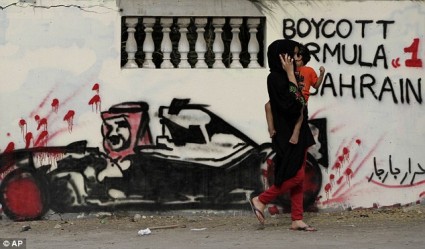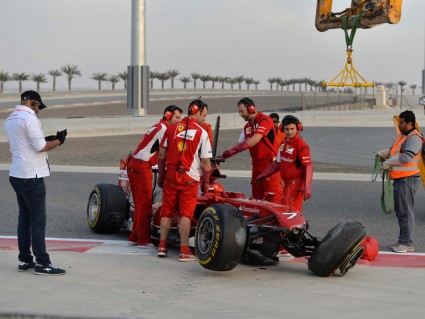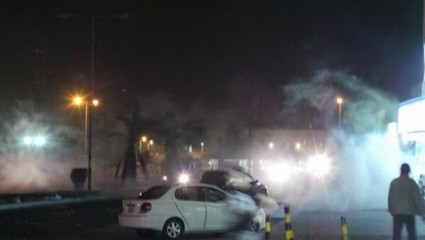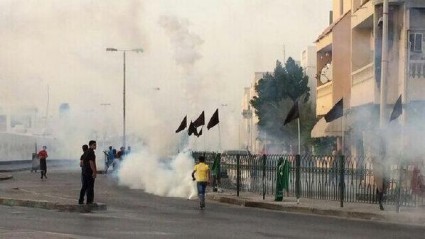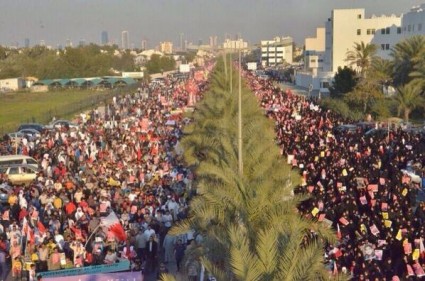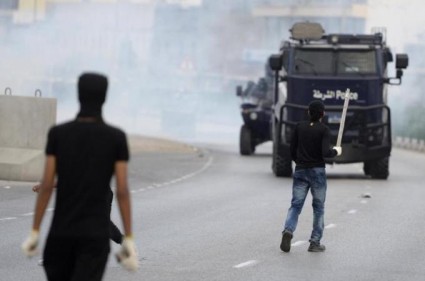Break The Shame, Break The Silence, Break The Chains, NO Bloody F1 Race in Bahrain
March 22, 2014 No Comments
MP, Kath Clark, Questions ‘FORMULA ONE: IMPLICATIONS IN BAHRAIN’
BRITISH MP CHAIRS ‘FORMULA ONE: IMPLICATIONS IN BAHRAIN’ EVENT AT PORTCULLIS HOUSE
21 March, 2014 – BCHR
Labour MP, Katy Clark, today chaired and hosted the Bahrain Institute for Rights and Democracy event at Portcullis House. The panel included Maryam Al-Khawaja, the acting president of the Bahrain Centre for Human Rights, Daniel Carey, a civil and human rights solicitor, and Nicholas McGeehan from Human Rights Watch.
Katy Clark took the opportunity to introduce a Early Day Motion 1194 which calls on the UK government to oppose the 2014 Formula One race in Bahrain “due to ongoing human rights violations.” The EDM also recalls concerns over the sexual abuse in custody of Rihanna al-Mousawi who was detained at the Bahrain Formula One track in 2013. It also recalls concerns over the extrajudicial killing of protester Salah Abbas during the race in 2012 by security forces. 25 MPs have signed the EDM to date.
Human Rights Violations in Bahrain
Acting President of the Bahrain Centre for Human Rights, Maryam al-Khawaja, began the discussion by highlighting the ongoing grave human rights violations in the country. She highlighted the dangers of the new Gulf Cooperation Council Security Agreement that “infringes upon the basic rights of all GCC citizens.” Ms. Khawaja furthermore highlighted the stringent environment and reprisals faced by human rights defenders in Bahrain and refuted the speech made by the Bahrain Foreign Minister in Geneva earlier this month noting:
“Bahrain uses terrorism as an explanation to justify the crackdown against individuals in the country, whilst attempting to convince F1 that it is safe to race in the country. Why are they hosting the F1 if there is terrorism in Bahrain? F1 would not go to Bahrain if that was the case.”
OECD Complaint Launched Against Formula One
Daniel Carey, who headed a legal team to file an OECD complaint to stop a 3 million shipment of tear gas canisters to Bahrain, took the opportunity to announce that an OECD complaint has been filed by Americans for Democracy and Human Rights in Bahrain against Formula One Management, sponsors and teams in the UK. The complaint alleges that the defendant organisations have not mitigated the human rights impact caused by their actions in the country. The complaint has been filed with the United Kingdom Department for Business, Innovation, and Skills in London, which is the UK’s National Contact Point for the OECD Guidelines.
According to the 2011 OECD Guidelines for Multinational Enterprises, organisations have a responsibility to “… avoid causing or contributing to adverse human rights impacts and address such impacts when they occur.” Organizations falling under OECD jurisdiction additionally must “seek ways to prevent or mitigate adverse human rights impacts that are directly linked to their business operations…” and “carry out human rights due diligence…” as appropriate to their involvement with abuses.
Mr. Carey also highlighted ’irresponsible statements’ made by Bernie Ecclestone in the past regarding the staging of the race in Bahrain. …more
March 22, 2014 No Comments
That this House opposes the staging of the 2014 Bahrain Grand Prix
BAHRAIN FORMULA ONE GP 2014
Session: 2013-14
Date tabled: 17.03.2014
Primary sponsor: Clark, Katy
Sponsors: Corbyn, Jeremy – Dobson, Frank – Leech, John – McDonnell, John – Huppert, Julian
That this House opposes the staging of the 2014 Bahrain Grand Prix due to ongoing human rights violations in that country; notes that Human Rights Watch’s 2014 World Report highlighted that Bahrain’s human rights record regressed in key areas in 2013 drawing particular attention to arbitrary detention, ill-treatment and torture of activists, prosecution and harassment of government critics and a failure to hold those guilty of human rights abuses to account; expresses deep concern that in previous years Bahrain has implemented a severe crackdown before and during the Grand Prix, restricting freedom of movement of persons in the country, detaining and deporting foreign journalists and conducting mass arbitrary detentions in towns close to the Formula 1 circuit; recalls with concern that previous Grand Prix have coincided with the extrajudicial killing of protester Salah Abbas in 2012 and the arbitrary imprisonment and alleged sexual abuse in custody of protester Rihanna al Mousawi in 2013; further expresses disappointment at the continued failure to hold security forces to account for these abuses, as well as the arrest, detention and torture of 27 employees of the Bahrain International Circuit in 2011; and urges the Government to make strong representations to try and prevent the 2014 Bahrain Grand Prix from going ahead. …more
March 22, 2014 No Comments
Bahrain’s brutal police force kill another with CS Gas – CS Gas IS NOT “less-than-lethal”
 Another Bahraini dies of tear gas inhalation
Another Bahraini dies of tear gas inhalation
18 March, 2014 – Islamic Invitation Turkey
Another Bahraini has died due to inhaling tear gas fired by Saudi-backed regime forces as the ruling Al Khalifa dynasty continues its violent suppression of peaceful pro-democracy rallies in the country.
Locals said they had witnessed extensive use of tear gas and poisonous fumes when Bahraini forces sought to disperse protesters during an anti-regime demonstration in the Wadiyan area of the northeastern island of Sitra on Monday, al-Manar television network reported.
The victim, identified as Jawad al-Hawi, died due to asphyxia after inhaling poisonous tear gas fired by regime forces. His funeral is due to be held later on Tuesday.
Meanwhile, a Bahraini court handed jail terms of 5 to 15 years to eight anti-regime protesters on charges of possessing weapons and explosive devices in the eastern village of Tubli.
Bahraini uprising started in mid-February 2011. On March 13 that year, forces from Saudi Arabia and the United Arab Emirates were dispatched to the country at Manama’s request to quell nationwide protests.
Scores of Bahrainis have been killed and hundreds injured and jailed by regime forces since the uprising broke out.
Last month, Amnesty International denounced the “relentless repression” of anti-regime protesters in the tiny Persian Gulf kingdom, blaming Bahraini security forces for their repeated use of “excessive force to quash anti-government protests.”
On February 14, UN Secretary General Ban Ki-moon called on the Bahraini regime to respect its “international human rights obligations” in dealing with peaceful protests in the country. …source
March 22, 2014 No Comments
Obama’s indifference toward Bahrain’s al Khalifa regime perpetuates it’s bloody reign
INSIGHT: Bahrain Uprising – Three Years In, Still No Way Out
13 February, 2014 – By Brian Dooley – Middle East Voices
Three years after Bahrain joined the Arab Spring uprisings in the Middle East, human rights defenders are left wondering when the Obama Administration will put action behind its flamboyant 2011 rhetoric about rights, freedom and the rule of law. Those who took to the streets in the small Gulf kingdom on February 14 that year, today are left wondering if President Obama had Bahrain in mind when he proclaimed “[H]istory is on the move in the Middle East …wherever people long to be free, they will find a friend in the United States,” or when he stated, “…we cannot hesitate to stand squarely on the side of those reaching for their rights, knowing that their success will bring about a world that is more peaceful, more stable and more just.”
To many people in Bahrain, President Obama’s words are undermined by the United States’ decision to send shipments of arms to the regime that represses them, as well as by the administration’s failure to bring any sanctions against senior Bahraini government officials deemed responsible for the torture of dissidents, including several deaths in custody, over the last three years. And while State Department emissaries have been on hand to monitor a series of trials widely considered unfair, they do little more than sit on the court benches witnessing injustice as it happens. Their silence is as deafening as it is telling.
insight hrf INSIGHT: Bahrain Uprising – Three Years In, Still No Way OutThe Bahraini regime’s pursuit of stability through repression obviously isn’t working, daily adding complexity and human suffering to an already volatile situation. On February 4, 2014, the King of Bahrain issued a new law (yes he can do that) clearing the way for jail terms for “any person who offends publically the Monarch of the Kingdom of Bahrain….” The actual length of the jail terms envisioned by the law is actually unclear as the English version of the law’s announcement specifies two years, the Arabic version – seven. Such flagrant stifling of dissent only adds to a general instability on the Gulf island.
” …no senior [Bahraini] government figure has been held accountable for deaths in custody, and key opposition leaders remain in jail.” – Brian Dooley, Human Rights First
The International Monetary Fund has warned that Bahrain’s “economic outlook depends on progress on the political front, and is subject to oil price risk… [and that] Bahrain’s fiscal break-even point has reached critical levels,” leaving the kingdom “vulnerable to a sustained decline in oil prices.” Future easing of oil sanctions against Iran is likely to drive prices for the commodity down even further, putting additional strain on the kingdom’s economy
reu bahrain dooley2 300 12feb14 INSIGHT: Bahrain Uprising – Three Years In, Still No Way Out
A protester holds a leaflet drawing attention to the case of an imprisoned photographer, at an anti-government rally in Budaiya, west of Bahrain’s capital, Manama, December 13, 2013. The leaflet reads in part: “Silence Kills Democracy.” (Reuters)
Bahrain’s government, meanwhile, insists it is committed to reform, pointing to a revised police code of conduct introduced in March of 2012, and the establishment of an ombudsman’s office. But it is hard to see what impact these reforms are having. Public protests are growing increasingly violent, leaving people dead on both sides. Bahraini authorities say over 2,300 police personnel have been injured and nine killed since the protests began in early 2011. Still today, there are nearly nightly demonstrations that often end in skirmishes between ill-trained police officers armed with tear gas and birdshot, and younger protesters hurling Molotov cocktails. …more
March 22, 2014 No Comments
Bahrainis fill streets with protests as inept regime fusses with pretense of reconciliation
Bahrain Shias protest against government
22 March, 2014 – Al Jazeera
Thousands of Bahrainis, mainly from the Shia majority, demonstrated near Manama on Friday against what they described as sectarian discrimination in the Sunni-ruled kingdom.
“No to discrimination,” chanted protesters brandishing Bahrain’s red-and-white flag as they marched along Budaiya main road, which links Shia villages with the capital, witnesses said.
Some protesters later clashed with riot police, who replied with tear gas.
Ali Salman, the chief cleric of the main Shia formation Al-Wefaq, was among leaders of the opposition who participated, according to images the group posted online.
They carried posters of prominent opponents jailed over their roles in the short-lived uprising of February 2011, including the Sunni head of the secular Waed party, Ibrahim Sharif, who is serving a five-year sentence.
“Sectarian discrimination is eating into the body of Bahrain in a systematic way applied by authorities,” opposition groups said in a statement at the end of the demonstration, referring to the Al-Khalifa dynasty.
The protest was held on the occasion of the UN’s International Day for the Elimination of Racial Discrimination.
Bahrain remains deeply divided three years after authorities quashed a Shia-led uprising, with regular protests sparking clashes with police, scores of Shia jailed on “terrorism” charges and reconciliation talks deadlocked. …more
March 22, 2014 No Comments
Slavoj Žižek on Jaws and The Ideological Trap of Fascism
March 22, 2014 No Comments
The new Cold War “shield”
Washington is making hay of its defeat in Ukraine: it is getting the Europeans to cut themselves off economically from Russia and is already imposing on them the expansion of its missile coverage. While the Western media focus on NATO’s narrative of events (the so-called “military annexation” of Crimea), the Alliance is noiselessly deploying its imperial apparatus.
The new Cold War “shield”
by Manlio Dinucci – Voltaire Network – 22 March, 2014
Vice President Joe Biden’s flash visit to Poland and Estonia to ensure that, in the face of “Russia’s shameless incursion” in Ukraine – a country determined to build “a government for the people” (guaranteed by the neo-Nazis [1] brought to power by the “new Gladio” coup [2] ) – the United States reiterates its unwavering commitment to comply with Article 5 of the North Atlantic Treaty on “collective defense.” As Ukraine is now a de facto, but not official, member of NATO, there is always “non-Article 5,” urging members to “execute evolving missions not described under Article 5,” which was promoted by the Italian government of Massimo D’Alema during the NATO war on Yugoslavia in 1999, and later also applied to the wars on Afghanistan, Libya and Syria.
To help “NATO emerge from this crisis stronger … than ‘ever’,” the United States repledged its commitment to the “missile defense” of Europe. However, by correlating the “missile defense” to the Ukrainian crisis, Joe Biden gave his game away. Washington had persistently maintained that the U.S. “shield” in Europe is not directed against Russia, but against the threat of Iranian missiles. In Moscow, on the contrary, this was always perceived as an attempt to gain a decisive strategic advantage over Russia: the U.S. could hold it under the threat of a nuclear first strike, relying on the ability of the “shield” to neutralize the retaliation effects [3] The new plan launched by President Obama, compared with the previous one, provides for a larger number of missiles lined up on Russia’s doorstep. Since they are under U.S. control, no one can find out whether they are interceptors or nuclear missiles.
Having rejected the proposal to jointly manage with Russia the Gabala radar station in Azerbaijan, the United States began building in Poland the site that will host 24 Aegis system SM-3 missiles. In addition, the Polish government has pledged to lay out more than 30 billion euros to achieve (with U.S. technologies) their own “shield” aimed to be integrated into the U.S. and NATO structure. And Joe Biden applauded Poland for its willingness to take on “part of the financial burden, something that all allies should do” (Italy is on notice). Another 24 SM-3 missile site, currently under construction at the Deveselu airbase in Romania, will become operational in 2015 and will be manned by 500 U.S. soldiers. These missile facilities comprise a super-powerful radar installed in Turkey and mobile radars that can be quickly deployed to “advanced positions.” …more
March 22, 2014 No Comments

